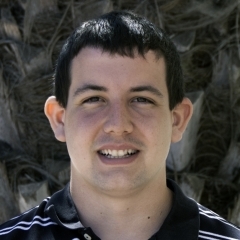
Date:
Location:
Speaker:
Title: Engineering Synthetic Systems Inspired by Anaerobic Fungi
Advisor: Michelle O’Malley
Abstract:
Unpretreated biomass is a promising source of renewable energy and value-added chemicals, however effective methods to release fermentable sugars from lignocellulose are needed. Lignocellulosic biomass is routinely degraded in the hindgut or rumen of large herbivores, and the effectiveness of this system is largely attributed to the diversity of the animal’s unique gut microbiome. Anaerobic fungi from these environments are among the most robust organisms at degrading lignocellulose, primarily through the production of multi-enzyme complexes called fungal cellulosomes. By elucidating the “parts” responsible for efficient biomass degradation in fungal cellulosomes and rumen anaerobic consortia, we sought to replicate the synergistic targeting of enzymes in synthetic cellulosomes and the diversity and stability in synthetic consortia. Through a combination of –OMICs approaches and traditional biochemical assays, the complete list of glycoside hydrolases as well as a putative scaffoldin molecule were identified in native fungal cellulosomes. Using the native parts list as a template, thermostable cellulases from Thermotoga maritima were adapted to the cellulosome system, demonstrating its applicability as a novel protein scaffolding system and providing a path forward for constructing synthetic cellulosomes. In a parallel effort, we implemented a selective enrichment process from herbivore fecal material, isolating a minimal consortium of fungi and methanogens capable of growth on unpretreated reed canary grass and other bioenergy crops. The consortium greatly exceeded the biomass-degrading capacity of fungi alone and demonstrated remarkable stability, remaining together in consecutive batch culture for over 18 months and 150 consecutive transfers. This “top-down” study was used to design synthetic consortia from the “bottom-up”, pairing fungi with methanogens whose genomes we had previously sequenced to identify favorable metabolite consumption. In combination, these “top-down” and “bottom-up” studies provided key insights towards designing stable consortia or synthetic cellulosomes for efficient bioprocessing of lignocellulosic biomass.



